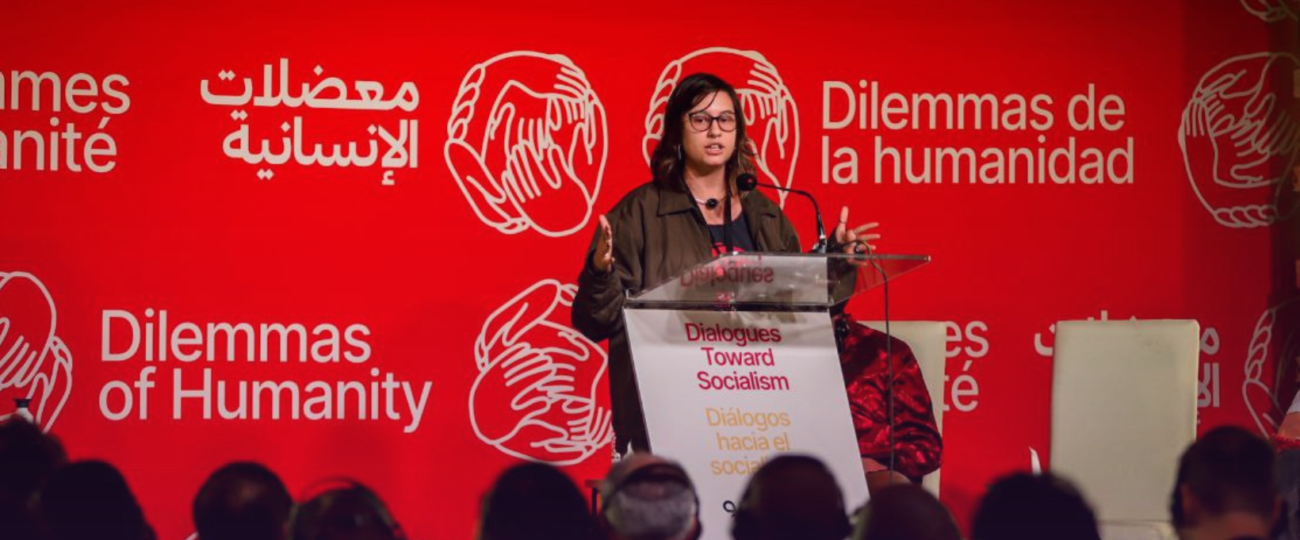The World March of Women carries an internationalist tradition. It is also a fruit of the lifelong struggle of our sister Nalu Faria. We continue to carry on the tasks Nalu has given us—they are many, for all of us, fighters of the world who have met her, her dedication, her devotion, and her accumulated knowledge.
So I start by addressing two reflections Nalu always provided to us. The first one is the importance of building internationalism, understanding that socialist and feminist struggles are anti-systemic and need to be international, with sisters and comrades from all over the world. The second reflection is about the importance of the process—not just the importance of this space we are building today, but the process that has brought us here and also the one that starts from this space.
Organizing Against Globalization
In what condition are we, working men and women, today? Our organization is a response and an alternative building to change the conditions we live in. In what scenarios do social movements emerge? How is the struggle organized? In Brazil, for example, between 1964 and 1985, we lived under a military dictatorship, in a process that, paradoxically, has led to the emergence of many of today’s social movements, including the Landless Workers’ Movement (MST), the Unified Workers’ Central (CUT), the National Association of Graduate Students (ANPG), and many others.
Then in the 1990s, we lived in a time when imperialism was imposing a globalization project onto us, further internationalizing the neoliberal economy that makes our lives increasingly precarious. Especially in Latin America, they tried to impose the FTAA, a free trade treaty, onto us. That moment, at the turn from the 1990s to the 2000s, the organization of movements created two different paths: some believed that fighting for the agenda of institutionality could provide opportunities; we, on the other hand, believed it could not. We understood that that was very similar to the conditions we were already living under, and that project was trying to intensify and trap us in a condition of subordination.
The United Nations (UN) did not represent us, and we understood that the necessary struggle and responses could only come from workers. Amid this context of neoliberalization, the World March of Women, La Via Campesina, and many other movements emerged, understanding that, if oppression is international, our response—our socialism, our feminism—must also be international.
The Working Class and Its Current Dilemmas
Today we are living a new turning point in the capitalist system. We see that the capitalist system is not only attacking labor, but also our lives. Capitalism is incompatible with life. We see this today in the struggle waged by our sisters and comrades from Palestine. We’ve also seen that in recent years, during the pandemic, because while people in countries in the global South were dying, the vaccine was already out and they could not access it. At that moment, many of us understood how the struggles to break vaccine patents and fight transnational pharmaceutical companies were part of a struggle of international solidarity of the working class.
The pandemic changed labor, and that change was even tougher on women. On the one hand, we have seen increasing uberization—not only on strictly work through platforms, but also as any rights are loosened. On the other hand, even under these precarious conditions, women have been forced out of this labor market. In Brazil, in 2020, 96 percent of the people who lost their formal jobs were women, according to a survey by the Annual List of Social Information (RAIS). This trend happened not only in Brazil, but around the world. Today there are many more men in the economically active labor force than women.
The crises of capital are necessary to retore profits, but also to restore their exploitation chains, of which the sexual division of labor is part. Crises go hand in hand with austerity policies, reducing the size of the state and of its health care, public education, and care systems. When the market forces us out of the labor market and the state fails to undertake these tasks, the message they send us is that this is women’s responsibility. That they want to put us back in our homes to carry out the work of caring for the sick, the children, the elderly, and also the men, who are in this economically active labor market that is increasingly making people ill.
For the capitalist system, all this care work is women’s work.
Ana Priscila Alves
This condition brings two elements to light: the first one is that wage labor is not the standard, not for the global South, not for women. There are many different types of informal, unpaid work. The second is the capitalist construct of false dichotomies, like production and reproduction, public and private, reason and emotion. All of them are meant to render free work carried out by women invisible. The work of reproduction of life sustains the economy. Assuming that women will bear the responsibility for care imposes onto us structural precariousness, marked by the capitalist, patriarchal, and racist system, as well as the international division of labor.
Feminist Alternatives To Change the World
We have no use for a feminism that is actualy capitalism painted purple. Feminism must be from the grassroots, dismantling the bases of this capitalist system that oppresses us around the world. We provide an alternative, feminist economy, capable of putting life on center stage. The economy is the set of tasks that ensure life and continue to make society work.
By understanding that the conflict of capital against life structures our society, we build these alternatives in our territories. In the pandemic, we understood the need to name those who oppress us and tackle the offensive of transnational companies—pharmaceutical, mining, the privatization of water, and others. Women provide answers because they are in the front line of this resistance in their territories, with memory, mística, family agriculture, and solidarity economy.
When we look at the alternatives proposed in our countries and territories, we realize this is the challenge of our historical time. In the 1980s, a number of social movements were able to emerge to struggle for democracy. In the 1990s, we struggled against capitalist globalization. Now is the moment to understand the reorganization of capital and fight to build socialism today, in our historical time.
This system that kills us cannot go on.
Ana Priscila Alves
Nalu Faria repeatedly said that the answer to the problems and dilemmas of humanity are in the working class, in everyday life, in the movements, in the alternatives we have built every day, in the places where we work and live. The answer to dismantle the material bases of capitalism is in the movements of resistance that we do around the world. This is our task: change the world to change women’s lives, and change women’s lives to change the world. And this is why we will continue to march until all of us are free.
____
By Ana Priscila Alves
Ana Priscila Alves is a World March of Women militant in Rio de Janeiro, Brazil. This is an edited version of her speech delivered at the panel “Organization of the working class,” held on October 15th, during the 3rd International Dilemmas of Humanity Conference in Johannesburg, South Africa.




